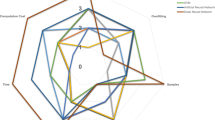Abstract
The carcinogenesis process is poorly understood and subject to varying concepts and views. A rejuvenated interest has arisen regarding the role of altered cellular intermediary metabolism in the development and progression of cancer. As a result, differing views of the implications of altered metabolism in the development of cancer exist. None of the concepts recognize and incorporate the principles of cell metabolism to cell activity, which are applicable to all cells including the carcinogenesis process. This presentation incorporates a novel concept of carcinogenesis that includes a “genetic/metabolic” transformation that encompasses these principles of cell metabolism to cell activity. The intermediary metabolism transformation is essential to provide the bioenergetic/synthetic, growth/proliferation, and migration/invasive events of malignancy. The concept invokes an “oncogenetic transformation” for the development of neoplastic cells from their precursor normal cells; and a required “genetic/metabolic” transformation for facilitation of the development of the neoplastic cells to malignant cells with the manifestation of the malignant process. Such a concept reveals stages and events of carcinogenesis that provide approaches for the identification of biomarkers and for development of therapeutic agents. The presentation discusses the contemporary application of genetics and proteomics to altered cellular metabolism in cancer; and underscores the importance of proper integration of genetics and proteomics with biochemical and metabolic studies, and the consequences of inappropriate studies.

Similar content being viewed by others
References
Vogelstein, B., & Kinzler, K. W. (2004). Cancer genes and the pathways they control. Nature Medicine, 10(8), 789–799.
Costello, L. C., & Franklin, R. B. (2005). ‘Why do tumour cells glycolyse?’: from glycolysis through citrate to lipogenesis. Molecular and Cellular Biochemistry, 280(1–2), 1–8.
Costello, L. C., & Franklin, R. B. (2006). The clinical relevance of the metabolism of prostate cancer; zinc and tumor suppression: connecting the dots. Molecular Cancer. doi:10.1186/1476-4598-5-17.
Costello, L. C., & Franklin, R. B. (2009). Integration of genetic, proteomic, and metabolic approaches in tumor cell metabolism. In K. Singh & L. C. Costello (Eds.), Mitochondria and cancer (pp. 79–92). New York: Springer.
Costello, L. C., & Franklin, R. B. (2008). Transformations of malignant cells (an overview). In M. A. Hayat (Ed.), Methods of cancer diagnosis, therapy, and prognosis (pp. 3–16). New York: Springer.
Baggetto, L. G. (1992). Deviant energetic metabolism of glycolytic cancer cells. Biochimie, 74(11), 959–974.
Kasper, S. (2008). Stem cells: the root of prostate cancer? Journal of Cell Physiology, 216(2), 332–336.
Dang, C. V., & Samenza, G. L. (1999). Oncogenic alterations of metabolism. Trends in Biological Sciences, 24(2), 68–72.
Hanahan, D., & Weinberg, R. A. (2000). The hallmarks of cancer. Cell, 100(1), 57–70.
Hanahan, D., & Weinberg, R. A. (2011). Hallmarks of cancer: the next generation. Cell, 144(5), 646–674.
Alqawi, O., Wang, H. P., Espiritu, M., & Singh, G. (2007). Chronic hypoxia promotes an aggressive phenotype in rat prostate cancer cells. Free Radical Research, 41(7), 788–797.
Warburg, O., Wind, F., & Negelein, E. (1927). The metabolism of tumors in the body. Journal of General Physiology, 8(6), 519–530.
Moreadith, R. W., & Lehninger, A. L. (1984). The pathways of glutamate and glutamine oxidation by tumor cell mitochondria. Role of mitochondrial NAD(P) + −dependent malic enzyme. Journal of Biological Chemistry, 59(10), 6215–6221.
Warburg, O. (1956). On the origin of cancer cells. Science, 123(3191), 309–314.
Weinhouse, S., Warburg, O., Burk, D., & Schade, A. L. (1956). On respiratory impairment in cancer cells. Science, 123(3191), 309–314.
Seyfried, T. N., & Shelton, L. M. (2010). Cancer as a metabolic disease. Nutrition and Metabolism. doi:10.1186/1743-7075-7-7.
Huggins, C. (1946). The prostate secretion. Harvey Lectures, 42, 148–193.
Costello, L. C., Guan, Z., Kukoyi, B., Feng, P., & Franklin, R. B. (2004). Terminal oxidation and the effects of zinc in prostate versus liver mitochondria. Mitochondrion, 4(4), 331–338.
Costello, L. C., Franklin, R. B., & Feng, P. (2005). Mitochondrial function, zinc, and intermediary metabolism relationships in normal prostate and prostate cancer. Mitochondrion, 5(3), 143–153.
Franklin, R. B., & Costello, L. C. (2007). Zinc as an anti-tumor agent in prostate cancer and in other cancers. Archives of Biochemistry and Biophysics, 463(2), 211–217.
Franklin, R. B., Feng, P., Milon, B. C., Desouki, M. M., Singh, K. K., Kajdacsy-Balla, A., et al. (2005). hZIP1 zinc uptake transporter down regulation and zinc depletion in prostate cancer. Molecular Cancer, 4(32), 13.
Cortesi, M., Fridman, E., Volkov, A., Shilstein, S. S., Chechik, R., Breskin, A., Vartsky, D., Kleinman, N., Kogan, G., Moriel, E., Gladysh, V., Huszar, M., Ramon, J., Raviv, G., et al. (2008). Clinical assessment of the cancer diagnostic value of prostatic zinc: a comprehensive needle-biopsy study. Prostate, 68(9), 994–1006.
Johnson, L. A., Kanak, M. A., Kajdacsy-Balla, A., Pestaner, J. P., & Bagasra, O. (2010). Differential zinc accumulation and expression of human zinc transporter 1 (hZIP1) in prostate glands. Methods, 52(4), 316–321.
Cooper, J. E., & Farid, I. (1964). The role of citric acid in the physiology of the prostate: lactic/citrate ratios in benign and malignant prostatic homogenates as an index of prostatic malignancy. Journal of Urology, 92, 533–536.
Costello, L. C., & Franklin, R. B. (2006). Tumor cell metabolism: the marriage of molecular genetics and proteomics with cellular intermediary metabolism; proceed with caution! Molecular Cancer. doi:10.1186/1476-4598-5-59.
Costello, L. C. (2009). The effect of contemporary education and training of biomedical scientists on present and future medical research. Academic Medicine, 84(4), 459–463.
Singh, K. K., Desouki, M. M., Franklin, R. B., Costello, L. C. Mitochondrial aconitase and citrate metabolism in malignant and nonmalignant human prostate tissues. Molecular Cancer, doi: 10.1186/1476-4598-5-14.
Costello, L. C., Littleton, G. K., & Franklin, R. B. (1978). Regulation of citrate-related metabolism in normal and neoplastic prostate. In R. K. Sharma & W. E. Criss (Eds.), Endocrine control in neoplasia (pp. 303–314). New York: Raven.
Acknowledgements
This report and the studies of LCC and RBF cited herein were supported in part by NIH grants CA79903, DK076783, and DK42839.
Author information
Authors and Affiliations
Corresponding author
Rights and permissions
About this article
Cite this article
Costello, L.C., Franklin, R.B. The genetic/metabolic transformation concept of carcinogenesis. Cancer Metastasis Rev 31, 123–130 (2012). https://doi.org/10.1007/s10555-011-9334-8
Published:
Issue Date:
DOI: https://doi.org/10.1007/s10555-011-9334-8




